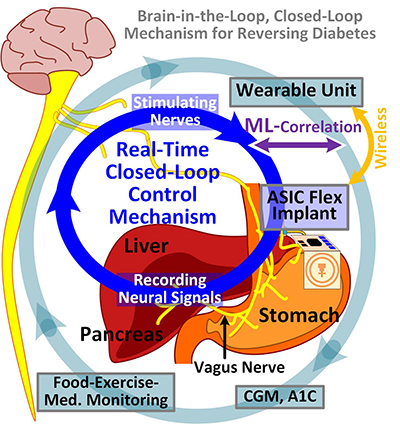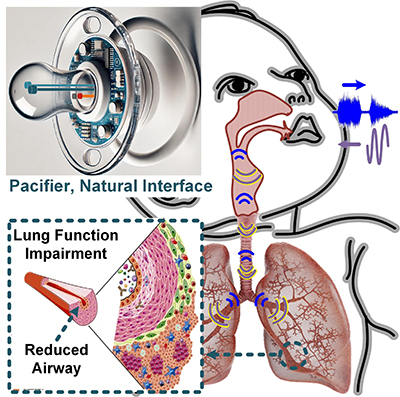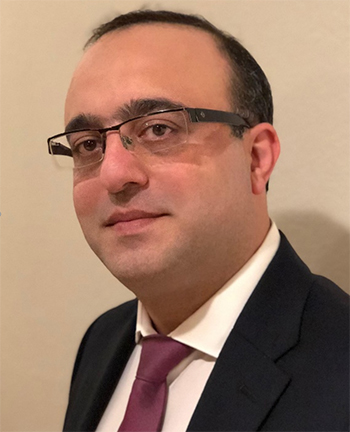S. Abdollah Mirbozorgi, Ph.D., an associate professor in the Department of Electrical and Computer Engineering at the University of Alabama at Birmingham, recently received federal grants for two projects that could be transformative for millions of patients.
One project will develop an implantable device to explore the possibility of diabetes reversal, while the other seeks to develop an AI-assisted version of a centuries-old device—the pacifier.
Mirbozorgi was awarded a $1.2 million grant from the National Center for Complementary and Integrative Health (NCCIH) of the National Institutes of Health (NIH) to develop an implant that will study how diabetes develops and potentially reverse it.
A separate project, funded $1.2 million by the NIH’s National Heart, Lung, and Blood Institute (NHLBI), will focus on the development of a “smart pacifier” that could transform how clinicians monitor infant breathing and vital signs.
Tackling Diabetes through Neuroengineering
 Diabetes affects more than 800 million people worldwide. In the United States, about 11.3% of the population lives with type 2 diabetes, 28.5% has prediabetes, and an estimated 8.5 million people are undiagnosed.
Diabetes affects more than 800 million people worldwide. In the United States, about 11.3% of the population lives with type 2 diabetes, 28.5% has prediabetes, and an estimated 8.5 million people are undiagnosed.
While there are plenty of pharmaceutical options to treat and control diabetes, Mirbozorgi is proposing a neurological approach by implanting a device that will map diabetes-related nerve activity in the brain. “This non-pharmaceutical approach will provide us with new information about the disease, but it also will allow us to use targeted vagus-nerve stimulation to advance reversal strategies,” Mirbozorgi said. “The results of these efforts will inform future treatments for diabetes and potentially other metabolic diseases as well.”
The implant Mirbozorgi’s team is developing will feature an application-specific integrated circuit (ASIC) that records nerve signals between the brain and the stomach and pancreas, analyzes those signals with on-implant AI (edge computing), and delivers stimulation in a closed-loop system.
Mirbozorgi is the principal investigator on this four-year project, which is a collaboration between UAB and Purdue University. Co-investigators from UAB include Amy Warriner, M.D.; Ananda Basu, M.D.; Rita Basu, M.D.; and Benjamin Larimer, Ph.D.; as well as Miad Faezipour, Ph.D. from Purdue.
Perfecting the Pacifier
While neurological implants are clearly a very recent advancement in medicine, it is difficult to imagine a more common device than an infant’s pacifier. A multi-disciplinary team that includes Mirbozorgi and researchers from Purdue University and UAB is looking to take that common pacifier and turn it into a high-tech device that holds the ability to assess an infant’s cardiopulmonary function.
 “Respiratory diseases are a leading cause of infant hospitalization, with hundreds of thousands of newborns admitted each year for breathing complications,” Mirbozorgi explained. “Many current monitoring tools are not designed for fragile newborns, leaving a major gap in respiratory monitoring and care.”
“Respiratory diseases are a leading cause of infant hospitalization, with hundreds of thousands of newborns admitted each year for breathing complications,” Mirbozorgi explained. “Many current monitoring tools are not designed for fragile newborns, leaving a major gap in respiratory monitoring and care.”
This project aims to close that gap with a first-of-its-kind pacifier that uses sound-sensing technology and artificial intelligence (AI) to track babies’ breathing in real time, safely and noninvasively. The device’s multimodal, active sound-sensing mechanism emits acoustic stimuli and analyzes intraoral sound reflections to assess cardiopulmonary function.
Purdue University leads this four-year R01, with Miad Faezipour, Ph.D., as principal investigator. Other co-investigators at Purdue include Smriti Bhatt, Ph.D.
Mirbozorgi serves as a co-investigator and UAB site PI. Additional UAB co-investigators include Namasivayam Ambalavanan, M.D., and Colm P. Travers, M.D., neonatologists at the UAB Heersink School of Medicine.
